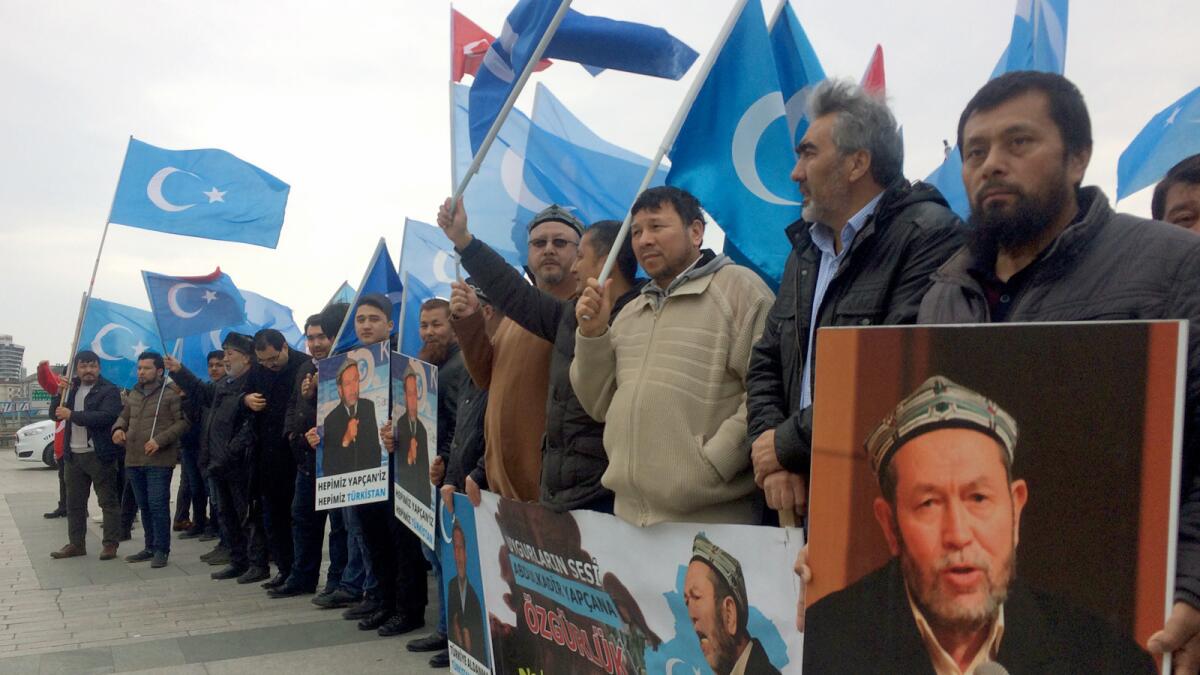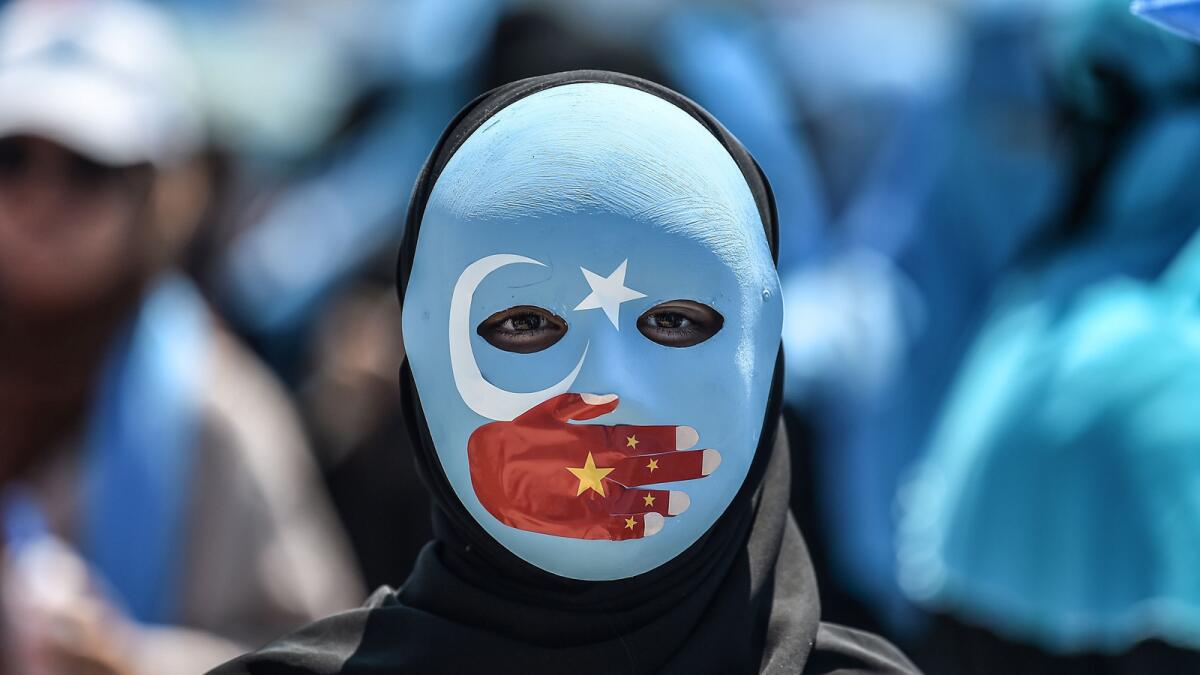Uighur dissident in Turkey fights effort to extradite him to China

- Share via
Reporting from ISTANBUL, Turkey — The Turkish government deems Abdulkadir Yapcan too dangerous to attend his own extradition proceedings here.
So instead he appears in court by video link from the detention center where he has been held for three years while he fights efforts to send him to China to face charges that he is a terrorist.
During a hearing last month, he watched in silence until a witness referred to Xinjiang, the region in western China where members of the country’s oppressed Uighur minority are concentrated.
“East Turkestan,” Yapcan interjected, using the name for the independent homeland that he and others envision.
He and his many supporters say that he has never supported violence and that he is being targeted for his political activism.
His case has become a focal point in international condemnation of China for its brutal crackdown on the Uighurs, whose Islamic faith and Turkic cultural heritage is viewed with suspicion by the government.
The United Nations says that more than 1 million Uighurs and other Turkic minorities are being detained in internment camps in China, a practice that U.S. Secretary of State Michael R. Pompeo this week called “abhorrent” and demanded be stopped immediately.
But the crackdown also extends abroad, with China seeking to extradite members of the Uighur diaspora it maintains are responsible for numerous terrorist attacks — even as human rights advocates and Western governments say that the evidence is often flimsy.
“Yapcan is No. 1 on China’s wanted list,” a witness who met him in a Chinese prison in 1993 testified at last month’s extradition hearing. “If they could, they would execute him a thousand times.”
The witness said that in China he endured pulled fingernails, electrocution and solitary confinement — and that the same treatment awaited Yapcan.
He and four other witnesses told the crowded court the accusations against Yapcan — that he founded and supported a Uighur terrorist organization with ties to Al Qaeda — were false and that if returned to China he would be swiftly tried and executed.
Outside the courtroom, hundreds of Yapcan’s supporters waved blue and white East Turkestan flags and held placards that said “Don’t be fooled, Turkey.”
Despite the favorable testimony and public support, and a 2016 ruling by the European Court of Human Rights that he not be sent to China, the court decided to keep Yapcan in detention while it continues to consider the evidence.

Turkey, which has cultural and historic ties to Uighurs, has usually been supportive of them and has never extradited one. But like many countries, it has stepped up efforts to court Chinese investment.
The next hearing is scheduled for May, though a backlog in the Turkish court system means that a decision could still be months or even years away.
China’s critics don’t dispute that hundreds of Uighurs belong to an Al Qaeda-linked organization in Syria and that they have called for attacks against Beijing.
But human rights groups say Chinese courts cannot be trusted to sort out who poses a genuine security threat and who is only advocating for Uighur rights.
“There’s a vast difference between going to fight a jihad in Syria, and being angry about what is happening to the Uighur population in China,” said Raffaello Pantucci, director of International Security Studies at the Royal United Services Institute think tank in London.
“The evidence presented [by Chinese authorities] is often not detailed, so we never quite know if you are dealing with a person who has been sent to launch an attack by an organization, or you have people who are being inspired to do so,” he said.
Germany and Sweden have banned deportations of Uighurs, but hundreds have been sent back to China from Pakistan, Cambodia, Malaysia, Egypt and Thailand.
“We have said for a long time that governments need to be very careful in considering Uighur asylum cases,” said Sophie Richardson, the China director at Human Rights Watch. “Because often, they are just sent back and they disappear into a black hole in China, and that is true now more than ever.”
In February, after reports that a Uighur folk musician with a popular following in Turkey had died in detention in China, the Turkish government called China’s “systematic assimilation against the Uighur Turks” a “great shame for humanity.”
China’s ambassador threatened that if such criticism continued, it “will be reflected in commercial and economic relations.”
Yapcan left China in 1997 using a false passport and traveled to Saudi Arabia and Pakistan, where he joined a small but active group of Uighur dissidents. He moved to Turkey in 2002 and lived freely there until the government, responding to pressure from China, detained him in August 2016.
Chinese authorities say he helped found the East Turkestan Islamic Movement, a group calling for an armed struggle against Beijing. Yapcan denies membership in the group.
He was, however, a regular guest on Istiqlal TV, an Istanbul-based Uighur internet television channel, where his interviews often extended into hours-long emotional tirades against China.
“He had no connection to any terrorists, but he was definitely working on the social level, he was talking in the press, on TV, at conferences against the oppression in China,” said Seyit Tumturk, who heads the National Assembly of East Turkestan, an international umbrella group of Uighurs in exile. “What Yapcan did, I was also doing, all that he did, all that he said, I also did, I also said, and it is not a crime.”
In 2003, China issued a list of 11 wanted Uighurs, including Yapcan. Some went on to win asylum in Western countries.
International forces captured 22 Uighurs in Afghanistan and Pakistan after 2001 and sent them to the detention camp run by the U.S. at Guantanamo Bay, Cuba.
By 2013, all had been released after the Pentagon determined they had no apparent organization or desire to harm the U.S. Wary of the treatment they might receive in China, Washington spent years negotiating their settlement in third countries.
With the outbreak of the Syrian war in 2011, Uighur militants found a new place to operate. Fighting alongside Al Qaeda and others, they set up a fledgling community in the rebel-held province of Idlib.
Pompeo met this week with a group Uighurs in Washington to draw attention to their plight.
“We are working to convince the Chinese that this practice is abhorrent and ought to be stopped,” he told reporters.
Sam Brownback, ambassador at large for international for religious freedom, condemned the Chinese government for wholesale abuse of religious minorities.
“China is at war with faith, but it is a war they will not win,” he said Thursday.
Brownback said that on a recent trip to China he raised the issue of massive detentions of Muslim Uighurs with Chinese authorities, but they repeated claims the prisons were just vocational training compounds.
China has long maintained that the camps are meant to combat extremism, separatism and terrorism, but the scope of the detentions has raised alarms in many Western governments.
Brownback said he was advocating for a strong U.S. response, possibly including economic sanctions.
Farooq is a special correspondent. Times staff writer Tracy Wilkinson in Washington contributed to this report.
More to Read
Sign up for Essential California
The most important California stories and recommendations in your inbox every morning.
You may occasionally receive promotional content from the Los Angeles Times.













